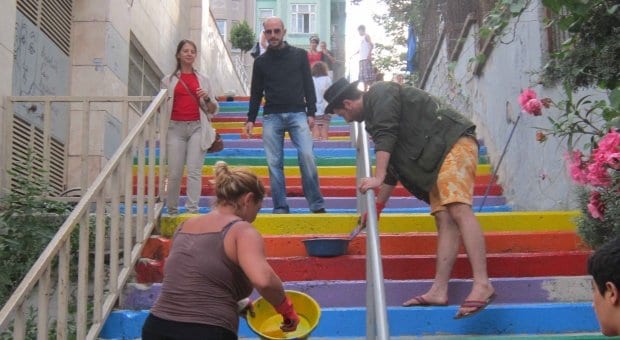Istanbul’s queer community has once again taken to the streets following clashes between Turkish police and protesters that broke out Sept 10 following the death of a 22-year-old who was allegedly killed after being hit by a police tear gas canister.
Ahmet Atakan was taking part in an anti-war protest in the southern province of Hatay, which borders Syria, when police intervened.
As the news of Atakan’s death spread on social media, protesters, including members of Istanbul’s queer community, mobilized as they did for the Gezi protests in June, calling the death another strike against civil rights in Turkey.
The violence comes just two weeks after the country’s LGBT community took part in the peaceful diren merdiven (resistance stairs) movement, which saw activists turning concrete steps into rainbow works of art. It began when a resident of central Istanbul decided to spend his money to paint a set of 200 concrete steps in rainbow colours.
But within three days, the municipality had painted over the rainbow steps, stoking anger among members of the city’s burgeoning gay rights movement.
Activists had organized a meeting to “paint and resist” on Aug 31, but before they could repaint the steps in rainbow colours, municipal workers had already recreated the rainbow steps — a win for LGBT organizers and supporters. Activists instead gathered on Aug 31 to paint new rainbow stairways in Istanbul and other parts of the country as a peaceful form of protest.
The rainbow-steps movement is one of many ways the country’s large queer community is fighting for its rights; its members are politically active on issues across the spectrum.
Turgay, who didn’t want to give his last name, is a member of Lambda Istanbul, a volunteer-run organization that provides support services for Istanbul’s queer community. He says the increased queer activism in the country has a lot to do with the fact that Turkey’s LGBT movement is relatively new, which means many members come from other organized movements. “They are aware that they are in the position of being oppressed in more than one of their identities and know that the resistance can be successful only when all these identities are in play,” he says.
“An individual can be freer as LGBTI but can still be oppressed because she is a woman or an Armenian or a Kurd or a worker, et cetera.”
But while the movement has seen some successes, there have also been setbacks.
On Sept 11, the government blocked gay dating site Grindr. A message on the website indicates that the Telecommunications Communication Presidency has acted upon a ruling made by the Istanbul Anatolia 14th Criminal Court for Peace. It says the ruling was made as a “protection measure.”
The Turkish government is currently in the process of drafting a new constitution, and LGBT organizations have worked furiously to ensure it includes sexual identity and gender identity (SOGI) in the article related to equality. However, members of the Parliamentary Constitutional Reconciliation Commission recently only agreed to mention SOGI in the preamble, but not within the article.

 Why you can trust Xtra
Why you can trust Xtra


